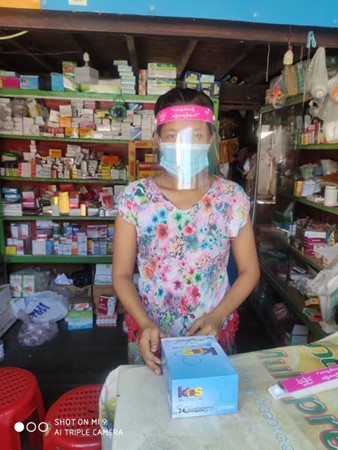
News
Despite pandemic and humanitarian crises, a family planning success story in Myanmar
January 27, 2022
FP2030 in the Media
Previous

News and Updates from FP2...
Next

Emergency Preparedness Mo...
Source:FP2030
Topics:
COVID-19 & Family Planning
Emergency Preparedness & Response
Postpartum & Post-Abortion Family Planning
Rights-Based Family Planning
By Vienna Madrid, Associate for Asia Region, FP2030
Over the past two years, the tenuous human rights environment in Myanmar has greatly deteriorated with the COVID-19 pandemic worsening inequalities and tensions between cultural groups. With the continued tension between Myanmar's military and ethnic armed groups, providing access to sexual and reproductive health is a significant challenge. The combination of the pandemic and the uncertain political situation exacerbates the sexual and reproductive health needs of people in Myanmar, as they face compounded effects of an unmet need for family planning.
Amid rolling outbreaks of COVID-19, the government of Myanmar put restrictions on movement, including curfews and lockdowns. While these steps were intended to restrict movement and stop the spread of the pandemic, the political and cultural conflicts instead created large-scale internal displacement. Lockdowns and humanitarian emergencies intensify the threat of gender-based violence, especially for women and girls. However, through the uncertainty of it all, family planning champions and longtime FP2030 partners DKT International and the United Nations Population Fund (UNFPA) have continued to provide contraceptives and other reproductive health services to people all over Myanmar.
During the pandemic, many public health systems in the country have been overwhelmed, making the provision of important family planning services more challenging than ever, according to DKT's team based in Yangon. However, DKT has worked tirelessly to ensure that women and couples not only have access to contraceptives and services, but also that they understand the importance of these services through innovative, educational marketing avenues. DKT International, a social enterprise involved in the education, promotion, and distribution of contraceptives, delivered over 1 million couple years of protection (CYPs) throughout Myanmar in 2021, representing the amount of contraceptives one couple will use for a year to prevent pregnancy. This number is an increase of 38% over previous years, the highest CYPs produced by the program since its inception. The DKT team’s motivation in continuing delivery of these essential services comes from the belief that in uncertain times, the only thing women and couples could be sure of is of avoiding an unplanned pregnancy through continuous use of modern contraceptives.

To that end, UNFPA in Myanmar has supported a national- and subnational-level coordination mechanism for family planning and sexual and reproductive health and rights to share information, updates, and operational challenges. UNFPA also conducted online capacity strengthening activities for sexual and reproductive health and family planning, as well as in-person training when possible (in accordance with pandemic protocols). During 2021, a total of 4,369 people received family planning information, awareness, and counseling services from UNFPA and partners. UNFPA and partners trained 651 family planning service providers including volunteers and peers. To improve the availability of family planning commodities and reproductive health commodity security, the UNFPA Myanmar team trained 182 supply chain managers, health, and logistics staff from partner organizations to set up electronic logistical management information systems (e-LMIS) in 31 warehouses and 406 health facilities.
UNFPA in Myanmar procured 367,100 CYPs of family planning commodities in 2021 but, like many other organizations, they continue to face shipment and manufacturing challenges in the current context, specifically the procurement and distribution of commodities. In response to these issues, UNFPA established an alternative storage and distribution system in partnership with DKT International. It also obtained and distributed emergency reproductive health kits including family planning commodities, and female dignity kits, to women and girls in crisis and conflict affected areas in Myanmar.
The collaboration between partners like UNFPA and DKT in Myanmar shows the importance of coming together, especially during uncertain times. The resilience and agility of these organizations are commendable, along with the efforts of many other partners in Myanmar that remain committed to ensuring the sexual and reproductive health of all people.








